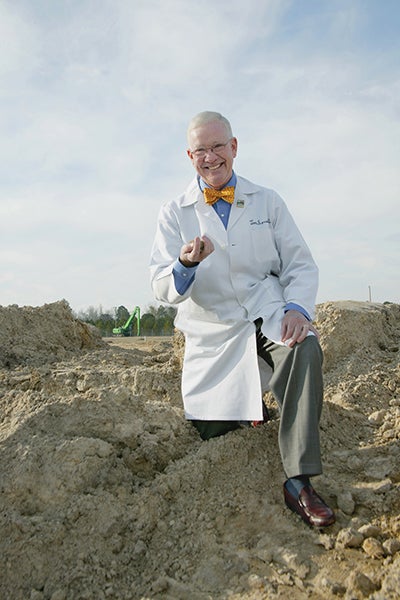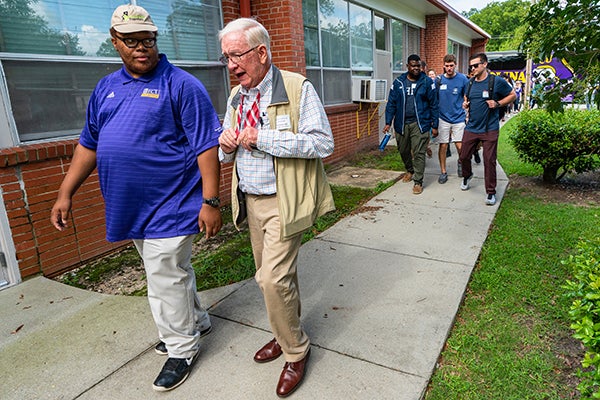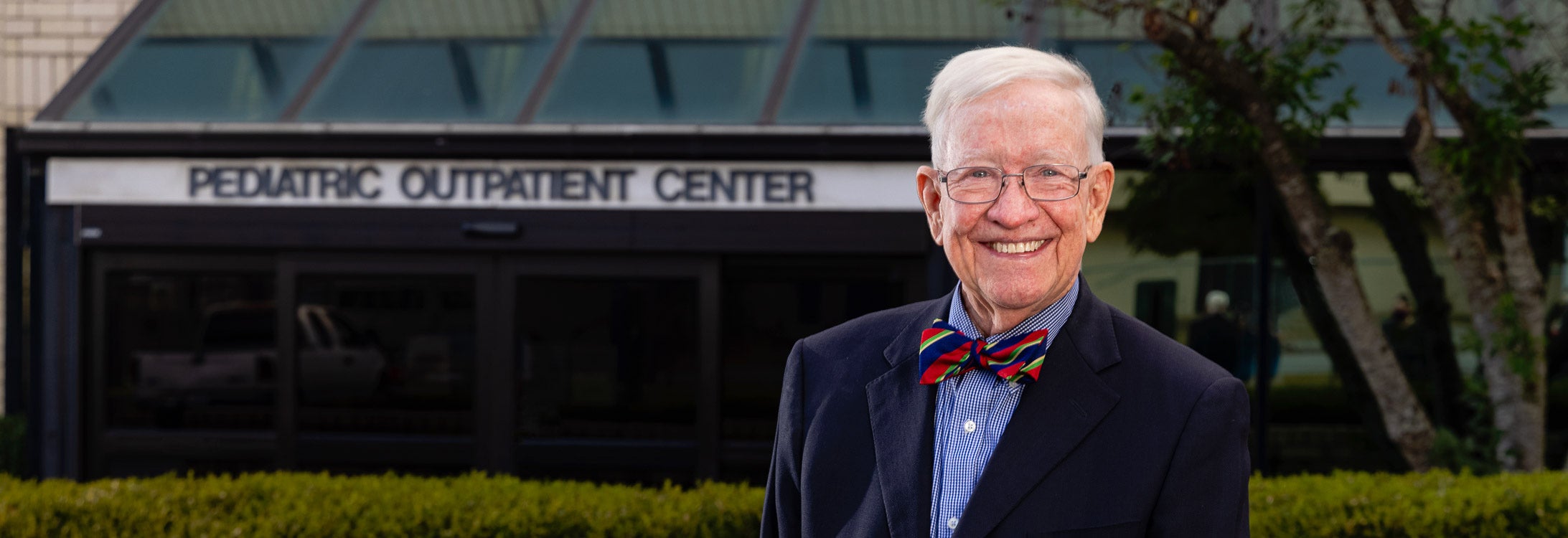CAREER KUDOS
ECU’s Irons earns career achievement award for advances in community health
Wherever Dr. Thomas G. “Tom” Irons goes, his reputation as a tireless advocate for health care access for all North Carolinians precedes him.
Irons is an East Carolina University fixture, whose character and determination — along with his signature bowtie or bucket hat — are trademarks of a legacy in the works.
Irons was awarded the 2021 Jim Bernstein Community Health Career Achievement Award on Oct. 22 by the Foundation for Health Leadership & Innovation, a Cary-based nonprofit organization that develops and supports innovative, community-driven partnerships that build a healthier North Carolina. The award, named for a pioneer in North Carolina’s advances in rural health, honors Irons’ 40-year career at the Brody School of Medicine. It also celebrates his relentless endeavor and fearless creativity to bring primary health care access to the underserved.
Irons is ECU’s associate vice chancellor for health sciences and a professor of pediatrics. He serves as the medical director for the N.C. Agromedicine Institute and was pivotal in establishing the James D. Bernstein Community Center in Pitt County, which was created to provide high-quality medical and dental care to low-income and uninsured patients. He holds and has held numerous other leadership roles at the university and in the community.
For closed captioning, view on YouTube.
Irons accepted the award during a virtual ceremony last Friday, when he honored his late wife, Carol, as the navigator of his career and credited Brody and its leadership over the decades “for giving me the time to do what my parents would have called ‘the Lord’s work,’” he said.
Irons’ father, Dr. Frederick Irons, served in leadership roles at Pitt County Memorial Hospital and improved student health services on campus. He held a clinical professorship at the medical school and was president of the Pitt County Medical Society. Irons’ mother, Dr. Malene Irons, was the first female physician in Greenville and the first pediatrician in the region. She worked with physician and civil rights leader Dr. Andrew Best to integrate Pitt County Memorial Hospital.
“When medical students ask me what led me to do the type of work I do,” Irons told the audience during the ceremony, “I tell them I was born into it, because I was.”
‘Do it right, do it well, do it together’
In the early 2000s when Dr. Greg Chadwick was working to establish a dental school at ECU and select locations for the school’s community service learning centers, he learned that Irons could help advise him on where the centers were most needed. Irons encouraged Chadwick to consider opening a dental center in Ahoskie and made connections that catalyzed a partnership and prototype for the dental school’s model of education and patient care.

Dr. Tom Irons was instrumental in the creation of the James D. Bernstein Community Health Center in Pitt County, for which Irons participated in the groundbreaking in 2006. (Contributed photo)
“I had heard of Tom Irons long before I met Tom Irons,” said Chadwick, dean of the ECU School of Dental Medicine. “He had a pretty big impact on what we were doing. We’d be hard pressed to find anybody who personifies community health in eastern North Carolina better than Tom Irons.”
Stories like Chadwick’s have become the stuff of legend all over eastern North Carolina — and beyond. Margaret Sauer, director of the Office of Rural Health in the N.C. Department of Health and Human Services, said Irons’ approach to community health is personal at every level.
“Dr. Irons has always been very clear about how important the community is in determining their health and health priorities,” Sauer said. “They have to be invited to the table for them to benefit. The community had to be first and at the table.”
Irons emphasized those beliefs during his acceptance speech.
“We can only build their trust through humility and kindness,” he said. “We have talents to bring to bear, but so do they.”
Sauer said when the state’s rural health office was forming, Bernstein and Irons helped design a plan for rural health in a way that would galvanize support in areas across the state. Irons’ authenticity, she said, added to his credibility.
“He is always willing to roll up his sleeves and participate and do the things he asks other people to do,” she said. “There’s nothing that he would not do to help.”
Now in his 40th year at Brody, Irons has focused on the needs of abused children, disabled children, at-risk teens, farm families and the rural uninsured. He is among the most distinguished faculty members in the history of ECU’s Brody School of Medicine. Irons received the 2011 UNC Board of Governors Award for Excellence in Public Service, and Brody’s Class of 2006 established the Thomas G. Irons Award in Medical Professionalism.
Irons practiced pediatrics in Raleigh before joining the medical faculty at ECU in 1981. In 1989, he was appointed associate dean of Brody and in 1995, he was named associate vice chancellor for health sciences.
After coordinating health services at Pitt County emergency shelters in the wake of Hurricanes Dennis and Floyd, Irons helped found Access East, Inc., providing quality health care services for underserved residents of eastern North Carolina. Irons has also served as medical director of the James D. Bernstein Community Health Center, HealthAssist and the N.C. Agromedicine Institute. He has received numerous other awards and honors and served on a variety of health organization boards.
Michelle Brooks, chief of staff to ECU’s vice chancellor for health sciences, has worked with Irons on community projects since the 1990s. On one occasion, she, Bernstein and Irons were in Washington, D.C. for a grant meeting that would potentially improve low-income patients’ access to health care. Irons outlined their plan in front of a packed room.
“At the end, he said, ‘You know, it really boils down to just a few things,’” Brooks recalled. “’We’re going to do what’s right, we’re going to do it well and we’ll do it together.’
“I’ve always remembered those words,” Brooks said. “They’re the words Tom leads by.”
‘An impact on our future’
Whether Irons is walking the Brody hallways or providing care in the community, he shows every person he meets the same compassion and kindness that have come to be known as distinctly Irons.
“He’s a champion, plain and simple,” said Dr. Ron Mitchelson, ECU’s interim vice chancellor for health sciences. “As a champion, he really brings a tremendous level of passion to his work. His legacy will be long-lived. He’s an empathetic leader who really brings a tremendous level of a respect to the work that he does.”

Dr. Tom Irons’ bus tour is a popular tradition for new medical students, on which they learn about the history and context of health care in the community. (Photo by Cliff Hollis)
Irons also helped pave the way for deserving North Carolina students to realize their dreams of becoming physicians.
Dr. Cedric Bright, interim vice dean for Brody and associate director for admissions for Brody, said Irons is an advocate for talented students from disadvantaged backgrounds.
“Dr. Irons has been very instrumental in helping our underrepresented students to acclimate here to the school,” Bright said. “He’s been a champion for advocating for them for admissions and he helps them understand the historical perspective about why it’s so important to have diversity in the work force and for medical care.”
When Bright came to ECU in 2019, Irons invited him to join the annual bus tour he gives for new medical students about the history and context of health care in the area.
“Dr. Irons is an invaluable resource for our medical students,” Bright said. “Medicine has a historical perspective. Dr. Irons is a link between what our past was, and he has an impact upon our future.”
Although Irons has no current plans to retire — “I’m a doctor and a teacher and I will always do those things” — he can summarize his career in words that have changed lives across a region and state.
“I’ve done the very best I could to do the right thing, and I’ve tried really, really hard to do the right thing well,” Irons said. “It’s important to take the time and effort to do it well. I’ve loved the privilege of serving. I’ve been really lucky.”
